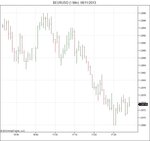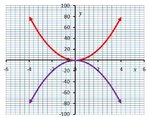There are many parties whom "they "relate to. What if you could just concern yourself with the "they" who are really most likely to move the market/control price. Would this then make the mission less complex? Can this even be done?
Yeah agree, thats pretty much what I was driving at here:
You would basically need to know the intent and timing of every individual
or collective that is capable of moving price.
Tough to say it can be done all the time, there are times and instances where
it is abundantly clear (Soros and sterling, obviously rare).
Other areas like small cap stocks - not worth the hassle of HFT icebergs there,
so things like large round size EOD trades still stand out - can be worth following
if its not isolated.
Downside with that is liquidity, spreads and easier manipulation - no free lunch.
Then you have the no brainer market shocks, downside moves are nearly always
steeper and faster.
Market shock scenarios that occur during or before the session preceding yours
can spill over into your session depending on severity.
Those need care though - is it real shock or over reaction.
An over reaction is more likely to claw back the losses of the prior session.
I spose what I'm saying is you can never truly know what 'they' are doing,
but there are certainly times that bring them out of the woodwork in force,
or circumstances in which its not worth them trying to hide their footprint.
From your point of view, you mean the tape and DOM, if you are good at it,
then the answer is yes, on balance you usually have a better idea of what 'they'
are doing.
Certainty is just a word, does it really have to mean 100%? After all, we make our own rules, we dont have to use the dictionary as the gospel.
Certainty brings with it a consensus that we are able to bet the ranch on one single trade. Thinking like this prevents us from really getting down to the nitty gritty IMHO, as we have created a state of mind which seeks this certainty before we even begin trying to understand true market dynamics.
Yeah in terms of the true definition you are correct.
Instead of saying there is no certainty, a better way of phrasing it:
there is no trade with a 100% guaranteed outcome.
Yet you can still have some degree of certainty of your decision making
based on long term results, until or unless the certainty of those results disappears.
Another thing to ponder with regards to the term "random"; What if we were to change the word random and replace it with "interference". Then cycles of randomness become cycles of interference. You can see how using words changes the way we consider things. Interference implies that there will be a cause and effect, where as with randomness, we can never gain anything from the information.
Generally randomness, or at least times of randomness in markets is really
just a synonym for a collection of events:
Low volume day, high volume buyer / seller equilibrium etc.
Plenty more, point is even those events are not truly random.
There is a reason for all of them:
Low volume - no reason to trade, or unified opinion that its time to sit on hands.
Equilibrium - no imbalance in opinion or volume.
I don't know about anyone else, but for me randomness is just a loose term for
saying price is unclear.
Strictly speaking it isn't really randomness or anything else.
True market randomness simply does not exist.
If it did you would have monster trends and peak volume in ETH instead of just RTH,
frequent and large gaps during RTH
and major economic releases at any time during a 24 hour day and so on.
For me randomness largely applies to trade outcome - I don't know which trades
will be winners or losers, if I did, I wouldn't ever take the losing trades.
So why does a losing trade occur?
Its simply because your stops, timing and opinion are out of whack with
those who are moving price at the same time you enter.
Nobody will ever solve that, because its hindsight trading.


